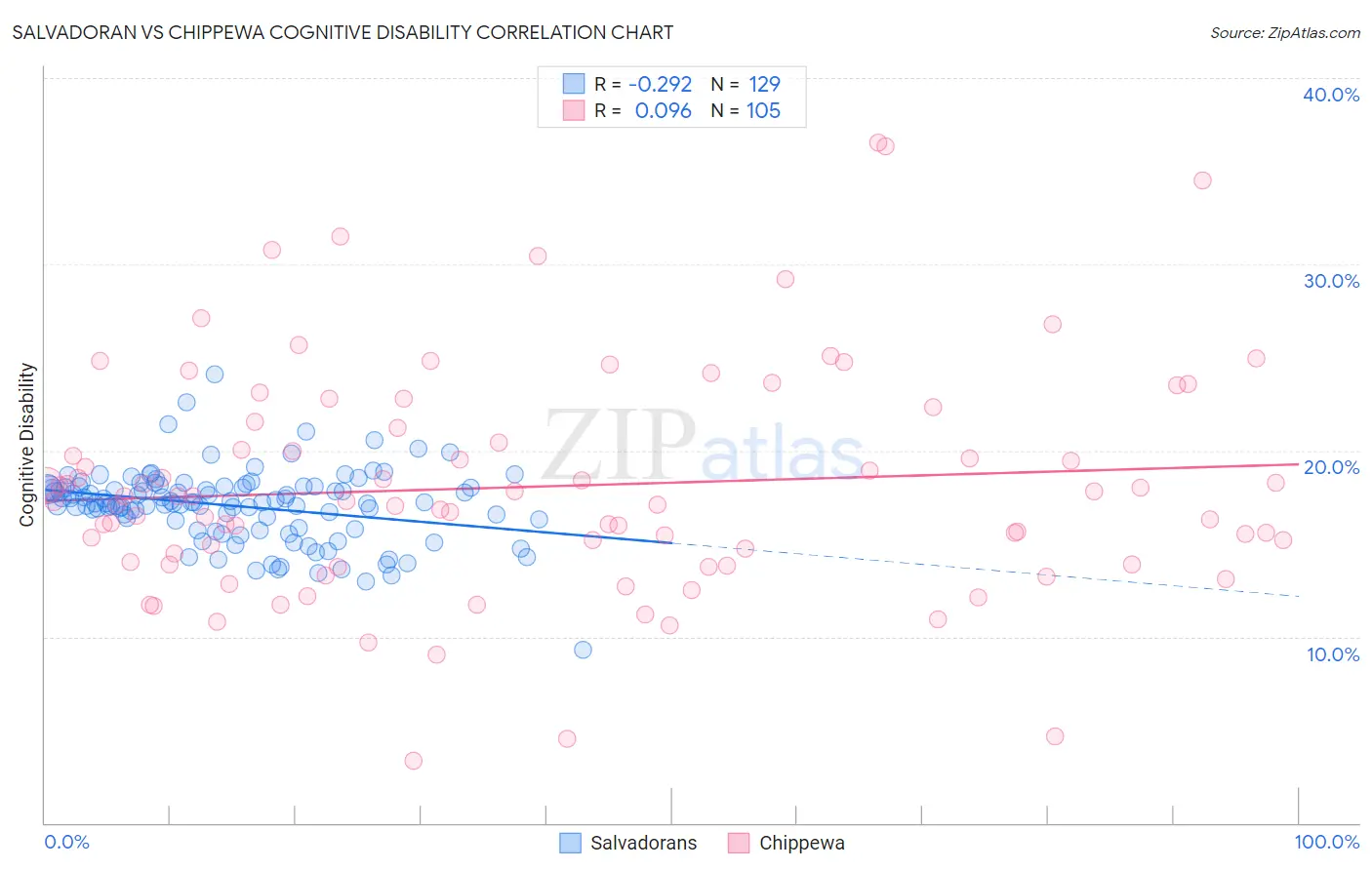Salvadoran vs Chippewa Cognitive Disability
COMPARE
Salvadoran
Chippewa
Cognitive Disability
Cognitive Disability Comparison
Salvadorans
Chippewa
17.6%
COGNITIVE DISABILITY
6.7/ 100
METRIC RATING
217th/ 347
METRIC RANK
18.1%
COGNITIVE DISABILITY
0.1/ 100
METRIC RATING
279th/ 347
METRIC RANK
Salvadoran vs Chippewa Cognitive Disability Correlation Chart
The statistical analysis conducted on geographies consisting of 398,952,602 people shows a weak negative correlation between the proportion of Salvadorans and percentage of population with cognitive disability in the United States with a correlation coefficient (R) of -0.292 and weighted average of 17.6%. Similarly, the statistical analysis conducted on geographies consisting of 215,049,109 people shows a slight positive correlation between the proportion of Chippewa and percentage of population with cognitive disability in the United States with a correlation coefficient (R) of 0.096 and weighted average of 18.1%, a difference of 2.7%.

Cognitive Disability Correlation Summary
| Measurement | Salvadoran | Chippewa |
| Minimum | 9.3% | 3.4% |
| Maximum | 24.1% | 36.6% |
| Range | 14.8% | 33.2% |
| Mean | 17.0% | 18.1% |
| Median | 17.2% | 17.3% |
| Interquartile 25% (IQ1) | 16.0% | 14.0% |
| Interquartile 75% (IQ3) | 18.0% | 21.4% |
| Interquartile Range (IQR) | 2.0% | 7.4% |
| Standard Deviation (Sample) | 2.0% | 6.1% |
| Standard Deviation (Population) | 2.0% | 6.1% |
Similar Demographics by Cognitive Disability
Demographics Similar to Salvadorans by Cognitive Disability
In terms of cognitive disability, the demographic groups most similar to Salvadorans are Alaskan Athabascan (17.6%, a difference of 0.020%), Okinawan (17.6%, a difference of 0.020%), Immigrants from El Salvador (17.6%, a difference of 0.030%), Icelander (17.6%, a difference of 0.030%), and Immigrants from Sierra Leone (17.6%, a difference of 0.040%).
| Demographics | Rating | Rank | Cognitive Disability |
| Immigrants | Jamaica | 8.5 /100 | #210 | Tragic 17.6% |
| Taiwanese | 7.7 /100 | #211 | Tragic 17.6% |
| Immigrants | Oceania | 7.3 /100 | #212 | Tragic 17.6% |
| Hawaiians | 7.2 /100 | #213 | Tragic 17.6% |
| Immigrants | El Salvador | 7.0 /100 | #214 | Tragic 17.6% |
| Alaskan Athabascans | 6.9 /100 | #215 | Tragic 17.6% |
| Okinawans | 6.8 /100 | #216 | Tragic 17.6% |
| Salvadorans | 6.7 /100 | #217 | Tragic 17.6% |
| Icelanders | 6.4 /100 | #218 | Tragic 17.6% |
| Immigrants | Sierra Leone | 6.3 /100 | #219 | Tragic 17.6% |
| Zimbabweans | 6.1 /100 | #220 | Tragic 17.6% |
| Moroccans | 5.9 /100 | #221 | Tragic 17.6% |
| Central Americans | 4.5 /100 | #222 | Tragic 17.7% |
| Alsatians | 4.5 /100 | #223 | Tragic 17.7% |
| Fijians | 3.4 /100 | #224 | Tragic 17.7% |
Demographics Similar to Chippewa by Cognitive Disability
In terms of cognitive disability, the demographic groups most similar to Chippewa are West Indian (18.1%, a difference of 0.010%), Immigrants from Micronesia (18.1%, a difference of 0.050%), Yuman (18.1%, a difference of 0.060%), Immigrants from Kuwait (18.1%, a difference of 0.060%), and Immigrants from Laos (18.1%, a difference of 0.10%).
| Demographics | Rating | Rank | Cognitive Disability |
| Immigrants | Honduras | 0.2 /100 | #272 | Tragic 18.0% |
| Immigrants | Nepal | 0.2 /100 | #273 | Tragic 18.0% |
| Immigrants | Nigeria | 0.2 /100 | #274 | Tragic 18.0% |
| Immigrants | Laos | 0.2 /100 | #275 | Tragic 18.1% |
| Yuman | 0.2 /100 | #276 | Tragic 18.1% |
| Immigrants | Kuwait | 0.2 /100 | #277 | Tragic 18.1% |
| Immigrants | Micronesia | 0.2 /100 | #278 | Tragic 18.1% |
| Chippewa | 0.1 /100 | #279 | Tragic 18.1% |
| West Indians | 0.1 /100 | #280 | Tragic 18.1% |
| Yakama | 0.1 /100 | #281 | Tragic 18.1% |
| Immigrants | Cambodia | 0.1 /100 | #282 | Tragic 18.1% |
| Nigerians | 0.1 /100 | #283 | Tragic 18.1% |
| Immigrants | Uganda | 0.1 /100 | #284 | Tragic 18.1% |
| Bermudans | 0.1 /100 | #285 | Tragic 18.1% |
| Kenyans | 0.1 /100 | #286 | Tragic 18.1% |